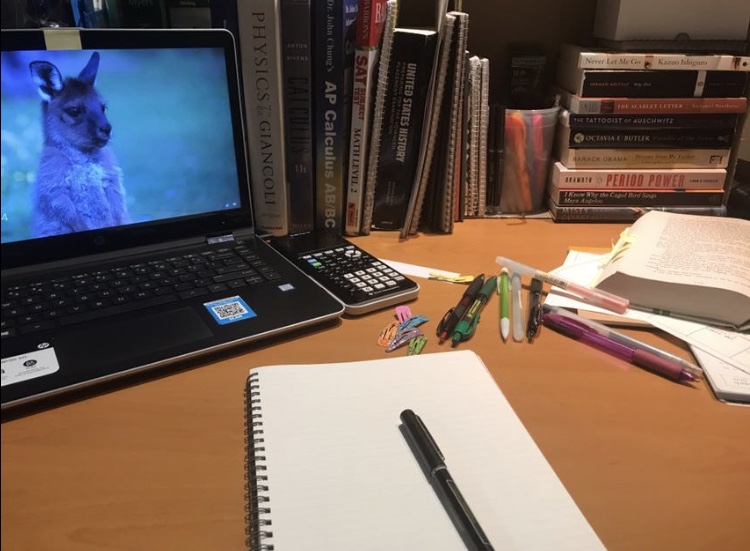A Critique of the Experience of Taking A.P. Exams Online Due to the Coronavirus Pandemic
Pictured is Hannah Goo’s AP Exam test taking set up. AP Exams were taken from home this year, due to the Coronavirus pandemic.
This year, the College Board decided to remotely administer the 2020 Advanced Placement exams, due to the Coronavirus pandemic. New York City canceled the New York State Regents exams, and Bronx Science canceled all “traditional” testing, given that all classes moved to remote instructions after March 16th, 2020. The CollegeBoard’s decision at first seemed perplexing given that the new test format was somewhat different, students could use their notes, and there was the potential for a lot of technical difficulties. However, despite the challenges, many Bronx Science students decided to take their Advanced Placement exams as they originally intended.
Students prepared for the day of their exams in various ways. During her Calculus BC and Physics 1 tests, Hannah Goo ’21 listened to music to help her destress and to concentrate better. This also helped her to enjoy taking the exams in a relaxed state of mind. While taking her United States History and English Language and Composition exams, however, Goo discovered that she needed a quiet room. Goo said, “I made sure that my room was quiet because I needed silence for my train of thoughts.” Similarly, Emma Nguyen ’21 said, “I closed my bedroom door and used a white noise machine, just in case. I also muted my phone and computer notifications.”
Although students were able to warn members of their households to respect their needed testing conditions, the actual content of some of the exams took some students by surprise. The Physics 1 course covers a range of topics from kinematics to mechanical waves, but the AP exam only covered 2-3 concepts. Due to the 45-minute time limit and two question limit, some students received two questions revolving around complex concepts, while other students were able to use information from the introductory units to answer the 2 to 3 of their 10 sub-questions.
Reese Villazor ’21 thought that her AP exam covered very little of what the entire curriculum had consisted of from September 2019 through March 16th, 2020. Goo ’21 and Arianne Brown ’22 both agree with this sentiment. Specifically, Brown took the AP World History exam, which covers 700 years of information, and she said that it was not fair that students were only tested on one topic. However, all of the students agree that the open notebook aspect of the tests was really helpful and took off the pressure of trying to remember every particular detail.
From a discussion with other students who took the same exact exams as me (AP Physics, AP Language & Composition, and AP United States History), I was able to deduce that for the various science exams, the College Board tests writers used 5-10 diagrams/situations. The writers could have created 10 to 20 problems for each of the 5-10 diagrams. Then, the students would only have 3-5 of those 10-20 questions to answer. This makes it easier for the graders to refer to only a couple of diagrams when grading.
Lavanya Manickam ’21 notes that this method of test making degrades the quality of the questions. Manickam noticed that her questions, in comparison to a different student’s questions who had the same diagram as her, were very straightforward. The other student’s questions dived more deeply into the science topic and tested the student on more knowledge.
As for the English and history exams, test writers used a similar methodology. There were around five different prompts, and the history exam had 7-10 different documents pertaining to each prompt, so that students would have to use different pieces of evidence in their essays.
Many students report that they were short on time and submitted their responses with only a minute or two left. Others could not submit their answers in time or had a submission malfunction. This was not the end of the world. Students were given the opportunity to e-mail the CollegeBoard within 48 hours to resubmit their answers or to schedule a makeup exam in June. Furthermore, CollegeBoard released the statement that “less than 1%” of students nationwide experienced submission issues, which in the grand scheme of things is not a bad number for CollegeBoard’s first attempt at large scale online testing, a heroic endeavor under the best of circumstances.
Luckily, Bronx Science students’ exams took place from 12 p.m. to 5 p.m. Eastern Standard Time, which gave them enough time to wake up and compose themselves. Hawaiian and international students had to take the exam anywhere from 2 a.m. to 6 a.m. I understand that the College Board was trying to prevent cheating, but administering the test at one time may have allowed some students the benefit of a good night’s sleep and deprived others of the same much needed rest.
Nevertheless, we must commend the College Board for quickly creating and uploading exams online. Due to social distancing requirements that must be in effect in order to combat COVID-19, there is no way that the exams could have taken place in person. Without the option of taking AP exams remotely, hundreds of thousands of students would not have had the chance to earn college credit and/or advanced standing. So, even with the few discrepancies, students should remember that the CollegeBoard did the best that they could given the current situation with the Coronavirus pandemic, and students should recognize that they were a part of AP exam history!
Students should remember that the CollegeBoard did the best that they could given the current situation with the Coronavirus pandemic.
Shaira Jafar is a Copy Chief for ‘The Science Survey.' She believes that journalistic writing gives writers the ability to write about anything that...

